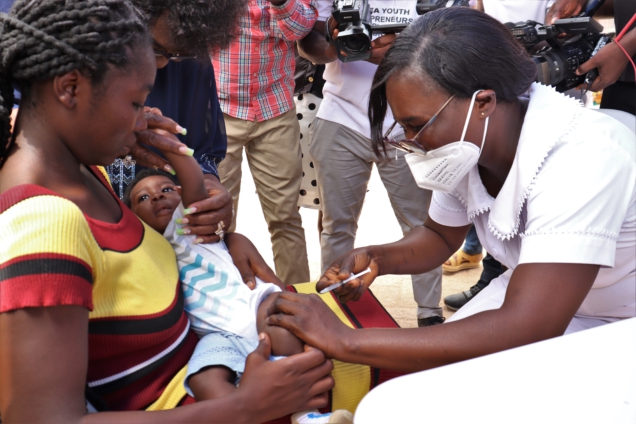The Mobile phone-based Interactive Voice Response IVR system called MobChild, aims at complementing existing health information systems for early detection of childhood illnesses.
With the success chalked at its initial implementation, Luv FM’s Emmanuel Kwasi Debrah looks at how the system can deployed nationwide.
At Akutuase CHPS compound in the Asante Akyem North District of the Ashanti region, I met Rose, a community nurse who has been impressed with the gamut of data on childhood diseases she has in her possession.
The record book which spans over 7 pages contains diseases like malaria, convulsions and other infections.
“We have a book that we normally use to take their records. Because of that it has really helped us to plan especially when we’re going for drugs. And we get to educate the caregivers on the normal home visits,” she says.
But that wasn’t the case some years back. The facility lacked the logistics to carryout extensive data collection.
What changed?
The African continent is generally plagued with lack of data which continues to negatively affect the diagnosis and treatment of diseases.
There was therefore the need to come with a well-functioning health system with a robust Health Information System (HIS) that could easily respond and deliver real-time data for the management of most of these preventable childhood illnesses.
The Mobile phone-based Interactive Voice Response IVR system called MobChild was thus born.
The system was a collaboration between the School of Public Health, KNUST and Esoko Ghana and funded by the International Development Research Centre which sought to complement and strengthen existing health information systems for early detection of childhood illnesses.
It does this by empowering caregivers to identify the health problems of their children for early intervention.
The caregiver calls into the system which responds in the local language, and on the basis of the symptoms, they will be directed as to what action to take.
A mother dials the toll free line 0800 711 711, and she’ll receive a voice prompt message on what’s wrong with the child. She’ll then follow the prompts and the system will pick the symptoms.
It is designed based on a clinical algorithm, involving integrated Management of Childhood diseases. After answering a set of questions, data on current disease symptoms are gathered and the call goes to a health practitioner who recommends an intervention.
In the situation the described illness needs advanced care, the caregiver is referred to the nearest health facility, which is alerted on the incoming illness.
According to a report I took from one of the researchers on the project, Dr. Aliyu Mohammed, there has been over 2,000 calls to the system as at 2021.
Furthermore, over 1400 were unregistered-without prior registration by the system but managed to seek help.
Dr. Aliyu Mohammed was happy with how the system has helped in salvaging data on under-5 mortality in the Ashanti region.
“Mobchild was conceptualized to among other things make data available to the district health management team.
“All caregivers accessed the system for health advice regarding what to do with their sick children,” he said.
Going national
The closure of the project in 2022, meant that the over 2,000 calls which could be made to the system for help would have to resort to old system of seeking healthcare.
More importantly, the crucial data “isn’t accessible to all health professionals”. Dr. Aliyu indicated to me.
The Principal Investigator of the project, Prof. Ellis Owusu-Dabo believes it’s about time the government takes up a health intervention like mobchild and extend it beyond the Ashanti region.
This he notes will make the data on under-five diseases available to all health professionals for effective diagnosis and treatment.
“This would mean investing in these kinds of initiatives and institutionalizing it,” he said.
With the District health management and information system (DHIMS) already in place in Ghana’s hospitals, Dr. Aliyu also adds the ideals of mobchild can be incorporated into the system.
“Mobchild can complement DHIMS to make it to make the system more robust,” he said.
This report is produced under the DPI Africa Journalism Fellowship Programme of the Media Foundation for West Africa and Co-Develop.
Latest Stories
-
“Guide to Schools” magazine to ease stress of parents
9 minutes -
Private Actors Welfare Scheme launched in Accra
19 minutes -
Akufo-Addo takes Mahama on Jubilee House tour ahead of inauguration
32 minutes -
Kantamanto fire incident: Wendy Shay donates to victims
37 minutes -
Livestream: 8th Parliament to dissolve to make way for 9th Parliament
51 minutes -
‘I want the Grealish that won the Treble’ – Guardiola
1 hour -
Foundervine CEO Izzy Obeng awarded MBE in King’s Honours List
1 hour -
MPs-elect for Akwatia and Fanteakwa North risk missing swearing-in over court injunction
1 hour -
Eschew greed among yourselves – Dr Sa-ad Iddrisu tells NDC’s incoming gov’t
1 hour -
Spare Mahama the 11th-hour lecture on debt management – Ricketts-Hagan to Akufo-Addo
2 hours -
Politicisation of free SHS has led to deliberate passing of beneficiaries – Economist claims
2 hours -
NDC is likely to face a serious banking crisis – Dr Sa-ad Iddrisu
2 hours -
Kantamanto Traders Assoc. disappointed with Gbese stool’s warning against market reconstruction by traders
2 hours -
Bongo MP-elect Charles Bawaduah commiserates with Kantamanto fire victims
2 hours -
The 8th Parliament performed better than many Parliaments in the past – Prof Kofi Abotsi
2 hours

